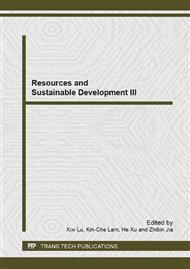[1]
M. V. Russo and P. A. Fouts, A resource-based perspective on corporate environmental performance and profitability, Academy of Management Journal, vol. 40, no. 3, p.534–559, (1997).
DOI: 10.5465/257052
Google Scholar
[2]
J. M. Stevens, H. K. Steensma, D. A. Harrison, and P. L. Cochran, Symbolic or Substantive Document? The Influence of Ethics Codes on Financial Executives' Decisions, Strat. Mgmt. J., vol. 26, no. 2, p.181–195, Feb. (2005).
DOI: 10.1002/smj.440
Google Scholar
[3]
L. M. Uhlaner, M. M. Berent-Braun, R. J. M. Jeurissen, and G. Wit, Beyond Size: Predicting Engagement in Environmental Management Practices of Dutch SMEs, Journal of Business Ethics, vol. 109, no. 4, p.411–429, Dec. (2011).
DOI: 10.1007/s10551-011-1137-x
Google Scholar
[4]
P. Arora and R. Dharwadkar, Corporate Governance and Corporate Social Responsibility (CSR): The Moderating Roles of Attainment Discrepancy and Organization Slack, Corporate Governance: An International Review, vol. 19, no. 2, p.136–152, Jan. (2011).
DOI: 10.1111/j.1467-8683.2010.00843.x
Google Scholar
[5]
J. L. Walls, P. Berrone, and P. H. Phan, Corporate governance and environmental performance: is there really a link?, Strat. Mgmt. J., vol. 33, no. 8, p.885–913, (2012).
DOI: 10.1002/smj.1952
Google Scholar
[6]
A. Paulraj, Environmental motivations: a classification scheme and its impact on environmental strategies and practices, Bus. Strat. Env., vol. 18, no. 7, p.453–468, Nov. (2009).
DOI: 10.1002/bse.612
Google Scholar
[7]
M. A. Delmas and M. J. Montes-Sancho, Voluntary agreements to improve environmental quality: Symbolic and substantive cooperation, Strat. Mgmt. J., vol. 31, no. 6, p.575–601, (2010).
DOI: 10.1002/smj.826
Google Scholar
[8]
L. A. Perez-Batres, J. P. Doh, V. V. Miller, and M. J. Pisani, Stakeholder Pressures as Determinants of CSR Strategic Choice: Why do Firms Choose Symbolic Versus Substantive Self-Regulatory Codes of Conduct?, Journal of Business Ethics, vol. 110, no. 2, p.157–172, Aug. (2012).
DOI: 10.1007/s10551-012-1419-y
Google Scholar
[9]
Q. W. Gou, Can Both Substantive and Symbolic Environmental Management get Paid?-An Empirical Study Based on China Listing Corporation, Advanced Materials Research, no. 807, p.760–763, (2013).
DOI: 10.4028/www.scientific.net/amr.807-809.760
Google Scholar
[10]
D. W. Ditz, J. Ranganathan, and R. D. Banks, Green ledgers: case studies in corporate environmental accounting, " agris. fao. org, 1995. [Online]. Available: http: /agris. fao. org/agris-search/search. do, f=1996/US/US96114. xml; US9607583.
Google Scholar
[11]
P. Bansal and I. Clelland, Talking trash: Legitimacy, impression management, and unsystematic risk in the context of the natural environment, Academy of Management Journal, vol. 47, no. 1, p.93–103, (2004).
DOI: 10.5465/20159562
Google Scholar
[12]
K. Walker and F. Wan, The harm of symbolic actions and green-washing: Corporate actions and communications on environmental performance and their financial implications, Journal of Business Ethics, vol. 109, no. 2, p.227–242, (2012).
DOI: 10.1007/s10551-011-1122-4
Google Scholar


